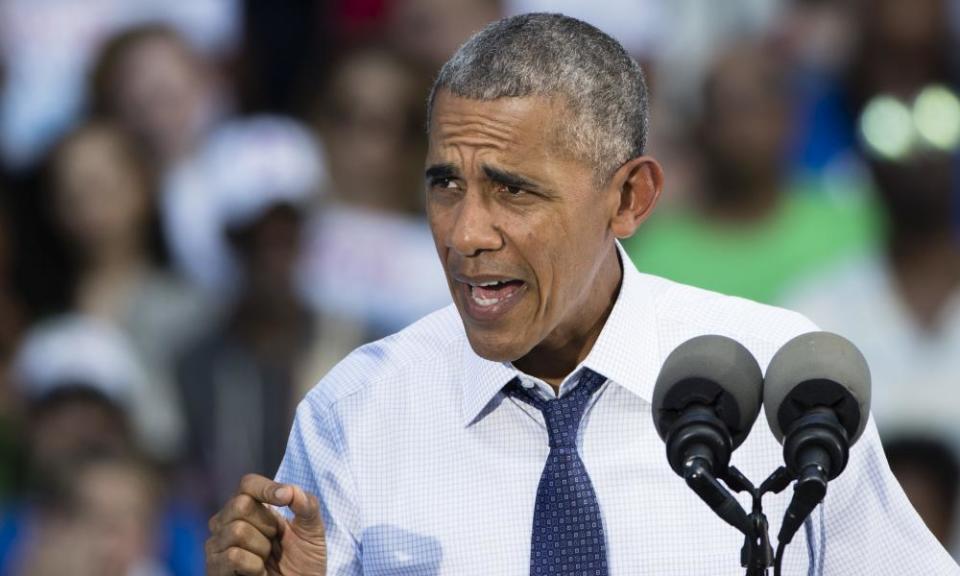'He still has the ability to inspire': Barack Obama returns to campaign for Democrats
In contrast to Trump’s rallies, the former president’s message to American voters will focus on the health of the country’s democracy

Barack Obama plans to hit the campaign trail this week to stump for Democrats ahead of the midterm elections in a move that will mark his most public return to the political arena since departing the White House.
The former president, who has kept a relatively low profile since leaving office and handing the White House over to Donald Trump in January 2017, is set to appear at a rally in California on Saturday.
He aims to stump on behalf of several Democratic candidates competing in races that are critical to the party’s prospects of retaking control of the House of Representatives in November. Obama will subsequently campaign on behalf of Richard Cordray, the Democratic candidate for governor in Ohio, bringing his political star power to one of the most closely watched contests of the 2018 election cycle.
Obama’s presence and style on the campaign trail will almost certainly draw a sharp contrast to Donald Trump, who has held rallies across the country for Republicans that unfold in characteristically raucous fashion. Obama is not expected to directly take on his successor, aides close to the former president said, but to instead tackle a pivotal moment for the health of American democracy.
Obama will kick off the series of public appearances at the University of Illinois on Friday, where he is accepting an award for ethics in government and expected to unveil some of the themes that will define his message to American voters this fall.
“He will make a pointed case in his speech on Friday, and on the trail this fall, that this moment in our country is too perilous for Democratic voters to sit out,” said Katie Hill, an Obama spokeswoman.
“He will echo his call to reject the rising strain of authoritarian politics and policies,” she added, while making the argument “that Americans must not fall victim to our own apathy by refusing to do the most fundamental thing demanded of us as citizens: vote”.
Last month, Obama backed 81 Democratic candidates for federal and statewide office in a first major wave of endorsements this cycle. Additional events are expected ahead of the 6 November midterms, his office said, with a further priority on helping candidates at the state level who will influence the electoral map in cases of future redistricting.
Obama has studiously avoided the political spotlight since Trump took office, weighing in only occasionally and primarily on issues pertaining to civil and human rights. His most impassioned public plea arguably came amid Republican efforts to repeal and replace the Affordable Care Act last year, Obama’s signature healthcare bill, in a speech that emphasized political courage.
The former president has otherwise rebuked Trump through written statements, although never mentioning his successor by name.
Obama has condemned several of Trump’s decisions, including his travel ban on several Muslim-majority countries, his move to rescind protections for young, undocumented immigrants, known as Dreamers, and his policy of separating families at the border. He also denounced the US withdrawal from the Paris climate accord and Iran nuclear agreement, decrying a “temporary absence of American leadership”.
Democrats have been clamoring for Obama, who enjoys high post-presidential approval ratings, to take on a bigger role in the Trump era. Jim Manley, a Democratic strategist who served as an aide to the late Senator Ted Kennedy and former Senate majority leader Harry Reid, said Obama’s popularity in the Democratic party was perhaps unparalleled.
“I think he still has the ability to inspire millions of Americans. He’s an effective orator and admired by many,” Manley said.
The only risk, he added, was providing Trump with a foil in an election that is poised to be a referendum on his presidency.
Aides familiar with Obama’s preparations said his messaging in the coming week and months will be about much more than Trump, focusing on a broader assessment of civic engagement and its role in upholding democracy.
His campaign appearances are likely to remain selective, but are in their own way a testament to Obama’s enduring influence over Democrats.
“We as a party have a problem. We don’t have a leader of the party right now,” Manley said.
“The former president is about as close as it comes.”

